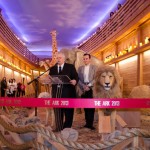NBC appears to be headed toward another Late Night debacle as rumors of replacing Jay Leno with Jimmy Fallon at the coveted 11:30pm spot have leaked into the media and even into Leno’s own sharp-edged jokes about getting fired. Apparently the idea is to swap out Leno’s locks, white with age, for Fallon’s in order to secure the younger demographic he pulls in.
Of course, NBC tried this before and given how well the 2010 Conan O’Brien incident went, you might think they would leave well enough alone. I mean, Leno has the highest ratings of any late night show, beating out Letterman and Kimmel by nearly half million to a million viewers each. He’s even still beating the younger Kimmel in the all-important 18–49 age demographic. Also, Jimmy Fallon just isn’t that funny. (Okay, maybe that’s just me.) If it ain’t broke, why fix it?
The Wrap summarizes:
“NBC isn’t reacting to Kimmel beating Leno — it’s reacting to its fears that Kimmel might start beating Leno soon.
“That’s because Kimmel is narrowly winning the 18–34 demo. It isn’t one of the key demos in late night, but NBC is thinking about keeping viewers 18–34 as they get older. They don’t want young viewers to form a Kimmel allegiance that could last for years.”
In essence, we have a fusion of two features of popular culture at work propelling NBC into what seems, on the face of it, a foolish move.
First, American pop culture is a youth culture. For various reasons that I can’t explore here, the concept of youth exerts a sort of centripetal force by which the interests and doings of college students and those just out of college are the focus and sum of our aspirations. The goal is to catch the attention of a 19-year-old, look like a 25-year-old, and speak with all the hip-savvy of a 30-year-old. Anything older is pushing it. I’m exaggerating, of course, but not by much. Age is not accorded with wisdom, nor do tradition and convention have any real purchase against the force of the trendy or the innovative. One of the ironies of our age is that as the population increasingly dulls and grays, our focus shifts more and more to all that glitters and shines.
The second feature is the iconization of our entertainers. In this secular, postmodern age, a vacuum exists where once a universal, common culture used to, leaving us to construct our tribal identities on the basis of whoever entertains us. Because of this, the focus is not so much on the entertainment, but the entertainer. In pop music, it’s not as much about the song, but the singer; we don’t talk about that new hit by Justin Bieber, but Justin Bieber’s new hit. We form deep brand loyalties to our icons, allegiances which last for years beyond the particular act, joke, or show. Of course, this is why we can’t allow our icons to age normally. If I’m going to identify myself through my relationship to you, in a culture dominated by youth, you can’t be old, sexually unattractive, or less-than-with-it. As Roger Scruton has observed, in our context the “pop star does not grow up…he grows side-ways.” (Modern Culture, pg. 111) Indeed, he can do nothing else.
Which brings us back to Leno. Why would NBC dump a two-decade, late-night powerhouse?
“Because Leno, at age 62, is nearing shuffleboard status and has a contract expiring next year. Fallon is a youthful 38, also with a contract expiring. NBC doesn’t want to lose him to a rival…”
Of course, none of this is meant to suggest that there is a particularly Christian position on the late night line-up shuffle. What Christians ought to reflect on is how much those two cultural forces are at work within their own lives as they go about about seeking be transformed by the renewal of our minds, rather than conformed the pattern of this world. (Rom. 12:2)
Speaking personally, I’m left asking myself: How caught up am I in the culture’s idolatrous worship of youth? Do I really believe that “gray hair is a crown of splendor; it is attained by a righteous life”? (Prov. 16:31) What does that mean for me as a balding dude? Does my fear of wrinkles and frantic struggle to hold on to every last hair betray a subtle disbelief in the coming resurrection when all things are made new?
Or maybe we ought to consider how much this plays into pop-Evangelical obsession with young, celebrity pastors? Is our baptism into Christ bedrock for us, or do the cultural patterns of identity construction have us more concerned about the pastoral brand we’ve bought into? (1 Cor. 1:12–13) Maybe the wisdom that often comes with crows’ feet and a hip replacement should be more valuable to us in our preachers than the cultural cache of their skinny jeans?
Questions such as these expose how pop culture’s values have shaped our own. Pop culture will continue to seek its young icons — but that doesn’t mean Christians have to follow.











